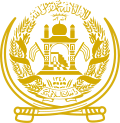Islamic State of Afghanistan
|
Because Afghanistan Islami Dowlat (Pashtun) Dowlat-e Eslami-ye Afghanistan (Persian) دا افغانستان اسلامی دولت دولت اسلامی افغانستان Islamic State of Afghanistan 1992–2002 |
|||||
|
|||||
|
|||||
|
Motto : Arabic لا إله إلا الله محمد رسول الله Lā ilāha illā llāh Muhammadun rasūlu llāh. for "There is no God but God and Mohammed is the Messenger of God." (see Schahāda ) |
|||||
| Official language |
Pashtun Persian |
||||
| Capital | Kabul | ||||
| Form of government | Islamic Republic | ||||
| Form of government | Transitional government | ||||
| Head of state | President of the Republic of Sibghatullah Modschaddedi (1992) Burhanuddin Rabbani (1992–2001) Hamid Karzai (2001–2002) |
||||
| Head of government | Prime Minister of Afghanistan | ||||
| surface | 647,500 km² | ||||
| currency | Afghani | ||||
| founding | April 24, 1992 (Peshawar Agreement) | ||||
| resolution | June 19, 2002 (convening of the Loja Jirga) | ||||
| National anthem | Qal'a-ye Islam, qalb-e Asiya | ||||
| Time zone | UTC +4.5 (March to October) | ||||
| License Plate | AFG | ||||
| Telephone code | +93 | ||||
| map | |||||
|---|---|---|---|---|---|

|
|||||
The Islamic State of Afghanistan ( Pashtun دافغانستان اسلامی دولت, Persian دولت اسلامی افغانستان) was proclaimed in Kabul on April 28, 1992 by an interim government led by Sibghatullāh Mujaddidi .
The structure of the state was negotiated by the leaders of the anti-Soviet resistance groups, supported by the Partscham faction of the Communist Party, and formalized in the Peshawar Agreement on April 26, 1992 .
According to William Maley, the new entity did not meet the characteristics of a state due to the extensive collapse of state structures in Afghanistan after the end of the government led by Mohammed Najibullāh . However, until the establishment of the Islamic Republic of Afghanistan at the end of 2001, the Islamic State of Afghanistan was the internationally recognized government of Afghanistan with its seat at the United Nations. The Islamic Emirate of Afghanistan of the Taliban was only recognized by Pakistan, Saudi Arabia and the United Arab Emirates.
See also
Individual evidence
- ^ Barnett R. Rubin: The Fragmentation of Afghanistan: State Formation and Collapse in the International System . Yale University Press, New Haven 2002, ISBN 978-0-300-09519-7 , p. 271.
- ^ William Maley: The Afghanistan Wars . Palgrave Macmillan, Basingstoke 2002, ISBN 978-0-230-21313-5 , p. 167.

